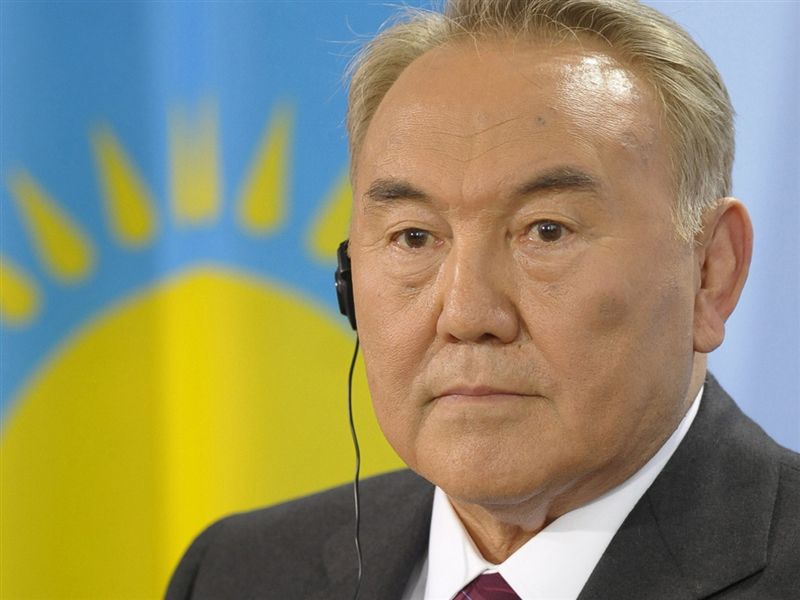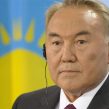
President Nazarbayev Discusses Kazakhstan’s Foreign Policy Priorities
Publication: Eurasia Daily Monitor Volume: 11 Issue: 30
By:

On February 5, President Nursultan Nazarbayev held his annual meeting with the foreign ambassadors and lead representatives of the local offices of major international organizations in Astana. More than 80 senior foreign diplomats accredited to Kazakhstan heard the president’s speech at the Akorda presidential residence (Astana Times, February 7).
In his remarks, Nazarbayev prioritized foreign economic cooperation in support of the Kazakshstan-2050 long-term development national strategy. He discussed how Kazakhstan wants to partner with the international community to promote mutually beneficial cooperation by increasing foreign investment, trade, and technology transfer to improve local innovation, entrepreneurship and skills. The economic sectors he discussed included agriculture, automobile, aviation, chemicals, food processing, and other industries and services. Nazarbayev pledged that his government would establish attractive conditions for foreign businesses and stressed how all could benefit if Kazakhstan could achieve its 2050 objective of becoming one of the world’s top 30 most developed economies (Ministry of Foreign Affairs, February 2).
With a GDP more than twice as large as the other four Central Asian countries combined, Kazakhstan already attracts much international business interest. According to Nazarbayev, the economy is currently growing at 6 percent annually, while unemployment and inflation is only around 5 percent. The World Bank’s 2014 Ease of Doing Business Index raised Kazakhstan’s level to rank 50 out of 189 countries (https://www.doingbusiness.org/).
Furthermore, Kazakhstan receives more foreign direct investment (FDI) than all its Central Asian neighbors. Inward FDI reached a record $28.8 billion in 2012, which exceeded the 2011 figure by $2.4 billion. Kazakhstan ranks among the 20 leading countries in attracting FDI. The government is now focusing on raising the small current share of FDI going to manufacturing rather than mining and natural resource extraction, which has received the overwhelming share of the existing FDI (Astana Times, January10).
In terms of general foreign policy priorities, Nazarbayev stressed his country’s continuing “pragmatism, consistency and balance” in executing its foreign policy strategy. On January 29, the president approved the new Foreign Policy Concept of the Republic of Kazakhstan for 2014–2020. According to Foreign Minister Erlan Idrissov, the text tried to combine a reaffirmation of traditional goals while adopting them to new international developments. In addition, the general aim was to establish a favorable environment for executing the “Kazakhstan-2050” strategy (Kazakhstanskaya Pravda, January 31).
As Nazarbayev explained in a recent speech, Kazakhstan wants to achieve “sustainable development” by developing new industries, particularly in niche markets; transitioning to a knowledge-based and green economy; producing more high-end products; developing more advanced technologies based on a post-petroleum energy sources; and making Kazakhstan a travel and trade hub between Europe and Asia. The “Kazakhstan-2050” strategy sees foreign investment, technology, and international experts as providing critical contributions towards this goal (https://www.akorda.kz/en/page/page_215752_).
In terms of functional and geographic priorities, the Foreign Policy Concept reaffirmed the country’s commitment to international peace and prosperity with a focus on the Central Asian region. In an earlier December 19 review of Kazakhstan’s foreign policy in 2013, Idrissov noted that Kazakhstan had signed a dozen bilateral agreements with neighboring Central Asian states that year (Astana Calling, December 20, 2013).
Yet, the Foreign Policy Concept stresses Kazakhstan’s intent to raise its international profile even further in coming years by expanding diplomatic contacts with non-traditional partners in Africa, South America, and Southeast Asia, with new Kazakhstani embassies planned for each region. The document also affirms that Kazakhstan will support the United Nations by assigning military observers to peacekeeping missions authorized by the United Nations and by campaigning for election to one of the non-permanent seats on the UN Security Council for the 2017–2018 term (Ministry of Foreign Affairs, January 29).
In his February 5 remarks, Nazarbayev singled out a few issues of special concern. He said that “Afghanistan remains the critical issue in Central Asia’s regional security.” The president called 2014 a very important year for Afghanistan given the upcoming presidential election and the withdrawal of most foreign troops from the country. He reaffirmed Kazakhstan’s intent to contribute to Afghanistan’s economic reconstruction and political stability. In his speech, Nazarbayev praised the North Atlantic Treaty Organization (NATO) for its contribution to regional stability through the Alliance’s exertions in Afghanistan: “International forces have played an historic role in the stabilization, not only of Afghanistan but also throughout Central Asia. For this, we greatly appreciate the contribution of the United States, Germany, United Kingdom and many other countries” (Ministry of Foreign Affairs, February 2).
Nazarbayev was hopeful about resolving the Iranian nuclear crisis. He recalled Kazakhstan’s contribution to the “Geneva breakthrough,” in which the Permanent Five Security Council members plus Germany (“P5+1”) negotiated an interim deal with Tehran last year to freeze some Iranian nuclear activities in return for a relaxation of some international economic sanctions on Iran. Not only did Almaty host two rounds of the P5+1 negotiations in 2013, but Nazarbayev also attended the inauguration of Hassan Rouhani to encourage the new Iranian president to reconcile with the West. Although Kazakhstani diplomats defend Iran’s right to pursue peaceful nuclear energy, Nazarbayev recalled how “Kazakhstan voluntarily abandoned nuclear weapons, was recognized by the world community for this and became a good ‘beacon’ for countries such as Iran” (Ministry of Foreign Affairs, February 2).
The president also tried to reassure foreign audiences uneasy about Kazakhstan’s strong support for Russian-led regional integration projects such as The Customs Union and the Eurasian Economic Union. The previous month, Idrissov had insisted before a Berlin audience that the intent was not to recreate the Soviet Union and that Kazakhstan and the other members of these bodies would insist on upholding their atonal sovereignty (Ministry of Foreign Affairs, January 31).
Calling for less “criticism and distrust” and more detailed examination of the “details and understanding the essence of the union,” Nazarbayev likewise argued that those countries that joined the Eurasian Union would “not be shut off from the world and will continue to actively cooperate with all partners.” For example, he endorsed Vladimir Putin’s proposal to create a free trade area between the new Eurasian Union and the European Union. He also stressed that Kazakhstan saw the Eurasian Union as “about economic cooperation” and “not a political organization.” The remarks presumably sought to dampen the competition between Brussels and Moscow over whether Ukraine and other former Soviet republics should prioritize one allegiance over the other.




